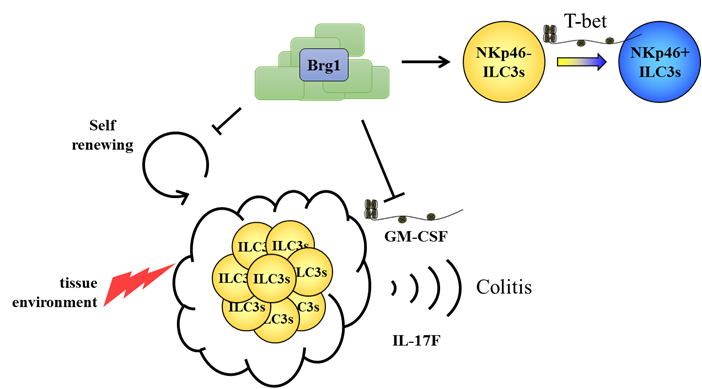Brg1 Restrains the Pro-inflammatory Properties of ILC3s and Modulates Intestinal Immunity
Group 3 innate lymphoid cells (ILC3s), a subset of the innate lymphoid cells, are abundantly present in the intestine and are crucial regulators of intestinal inflammation. ILCs act early in the immune response by reacting promptly to cytokines produced by antigen presenting cells. Such a trait is contributed by chromatin remodeling during development prior to activation. However, it is not clearly understood how chromatin remodelers orchestrate ILC3s and intestinal immunity. Brg1 (Brahma-related gene 1), a catalytic subunit of the mammalian SWI-SNF-like chromatin-remodeling complex, regulates the development and function of various immune cells.
Recently, the research groups led by Dr. QIU Ju and QIN Jun from Shanghai Institute of Nutrition and Health of the Chinese Academy of Sciences collaboratively find that Brg1 regulates the differentiation and proliferation of ILC3s and restrains its pro-inflammatory properties. The study entitled "Brg1 restrains the pro-inflammatory properties of ILC3s and modulates intestinal immunity" was published online on July 1, 2020 in Mucosal Immunology.
By specifically deleting Smarca4 (encoded by Brg1) in ILC3s using Rorc-cre mouse, researchers found that Brg1 deficiency leads to abundant accumulation of ILC3s in the intestine, a great reduction of NKp46+ILC3s and spontaneous colitis in mice of the Rag1–/– background.
Mechanism studies showed that Brg1 supports the differentiation of NKp46+ILC3s by promoting the T-bet expression in NKp46–ILC3s, which facilitates the conversion of NKp46–ILC3s to NKp46+ILC3s. And the colitis is contributed by ILC3s highly expressing pro-inflammatory cytokine GM-CSF in the absence of Brg1. ATAC-seq and ChIP Q-PCR assay further demonstrated that Brg1 binds to the Tbx21 and Csf2 gene locus in ILC3s, and favors the active and repressive histones modifications on gene locus of Tbx21 and Csf2 respectively.
The findings provide new insights into the mechanisms of ILC3s subsets differentiation and regulation of ILC3s in inflammatory bowel diseases.
The study was accomplished by QI Xinyi as the first author, and was supervised by Dr. QIU Ju and Dr. QIN Jun. This work was supported by grants from the National Natural Science Foundation of China, the Ministry of Science and Technology, the Chinese Academy of Sciences, and Shanghai Jiao Tong University School of Medicine.

Brg1 regulates the differentiation of NKp46+ILC3s and limits the pro-inflammatory properties of ILC3s by suppressing GM-CSF. (Image provided by Dr. QIU Ju's group)
Media Contact:
WANG Jin (Ms.)
Shanghai Institute of Nutrition and Health,
Chinese Academy of Sciences
Email: sibssc@sibs.ac.cn
